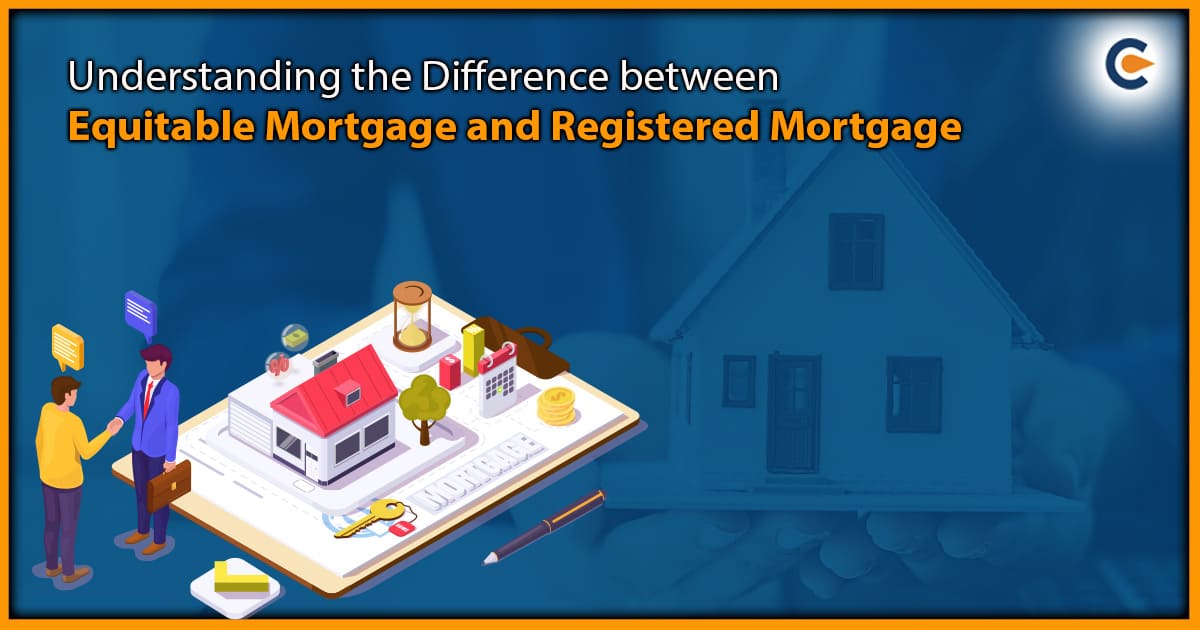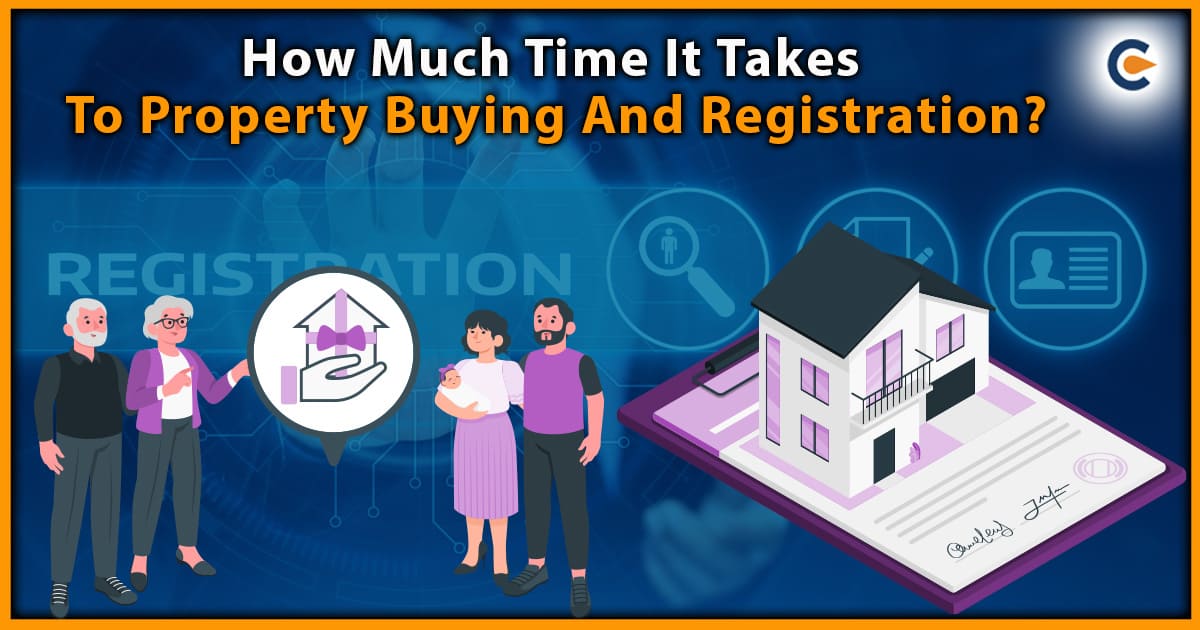In real estate financing, mortgages are pivotal, enabling individuals and businesses to secure loans against their properties. Difference between Equitable Mortgage and Registered Mortgage mainly Two common types of mortgages are equitable mortgages and registered mortgages. While both serve as security instruments for loans, there are fundamental differences between the two. This blog post aims at the dissimilarities between equitable mortgages and registered mortgages, helping you navigate the intricacies of property financing.
A mortgage is a legal agreement between a borrower (and the mortgagor) and a lender (the mortgagee) that provides financing for the purchase of real estate or the use of the property as collateral for a loan. It is a loan secured explicitly by the purchased property or offered as security. Here we are going to see Difference between Equitable Mortgage and Registered Mortgage
Here’s how a mortgage typically works:
- Borrower’s Intention: The borrower intends to purchase a property or requires funds and is willing to offer an existing property as collateral to secure a loan.
- Loan Application: The borrower approaches a lender, such as a bank or a mortgage company, to apply for a mortgage. The borrower provides the necessary financial and personal information for the lender to evaluate their creditworthiness and the loan amount and terms.
- Property Valuation: The lender may appraise the property to determine its market value. This evaluation helps establish the loan-to-value ratio, the percentage of the property’s value that the lender is willing to finance.
- Loan Approval: If the lender is satisfied with the borrower’s financial profile and the property’s value, they may approve the mortgage application. The lender specifies a mortgage agreement’s loan amount, interest rate, repayment terms, and other conditions.
- Mortgage Agreement: This agreement is a legal document that outlines the terms and conditions of the loan. It includes details such as the loan amount, interest rate, repayment schedule, both party’s rights and responsibilities, and any specific provisions related to the mortgage.
- Collateral and Registration: The borrower offers the property as collateral for the loan, granting the lender a security interest or lien on the property. The mortgage agreement is then registered with the appropriate government authority, such as a land registry or a similar institution. This registration ensures the mortgage is a matter of public record and provides notice to third parties.
- Repayment: The borrower must make regular monthly payments to repay the loan amount and receive interest over the agreed-upon term. Failure to make payments may result in penalties, late fees, or even foreclosure, where the lender takes possession of the property to retrieve the outstanding debt.
- Mortgage Release: Once the mortgage is fully repaid, the lender issues a mortgage release or satisfaction document, indicating that the loan obligation has been fulfilled and the mortgage no longer encumbers the property.
It’s important to know the specific terms, requirements, and legal procedures related to mortgages may vary across jurisdictions. Borrowers should consult with legal and financial professionals to understand the specific laws and regulations governing mortgages in their area.
Equitable Mortgages
An equitable mortgage is created based on an agreement or understanding between a borrower (mortgagor) and a lender (mortgagee). In this arrangement, the borrower pledges their property as collateral for a loan. It is called an “equitable” mortgage because it is based on the principles of equity, fairness, and trust.
Characteristics of equitable mortgage
Equitable mortgages possess several distinct characteristics that set them apart from other mortgage arrangements. Let’s delve deeper into the key characteristics of an equitable mortgage:
- Agreement-based: An equitable mortgage is created through an agreement or understanding between the borrower (mortgagor) and the lender (mortgagee). The terms and conditions of the mortgage, such as the loan amount, interest rate, repayment terms, and the property used as collateral, are typically outlined in this agreement.
- No registration requirement: Unlike registered mortgages, equitable mortgages do not require registration with a government authority, such as a land registry. This means the mortgage is not being publicly recorded or disclosed. However, it is important to note that some jurisdictions may require the equitable mortgage to be in writing or evidenced in some tangible form to be enforceable.
- Equitable charge: An equitable mortgage grants the lender an equitable charge or interest in the property offered as security. This charge gives the lender the right to sell or take possession of the property if the borrower defaults on the loan. Although an equitable charge is not as strong as a legal charge (created by a registered mortgage), it still provides the lender with certain rights and remedies.
- Priority based on creation date: In cases where multiple equitable mortgages on the same property, the priority are generally determined based on the creation date. The first equitable mortgage created will generally hold priority over any subsequent equitable mortgages created on the same property.
- Limited enforceability against third parties: One notable characteristic of equitable mortgages is that they may have limitations in terms of enforceability against third parties who acquire an interest in the property without knowledge of the mortgage. If a third party purchases the property without notice of
- The equitable mortgage, they may take the property free from the mortgage unless specific legal protections are in place.
- Equitable remedies: In the event of default by the borrower, the lender of an equitable mortgage can seek equitable remedies through the court system. These remedies may include foreclosure, sale of the property, or other appropriate relief to recover the outstanding debt.
It is important to note that the characteristics of equitable mortgages can vary depending on the legal jurisdiction. The laws governing equitable mortgages may differ, and it is advisable to seek legal advice to understand the specific requirements and implications in your jurisdiction.
What is a registered mortgage?
A registered mortgage, also known as a legal or statutory mortgage, is a type of mortgage formally registered with a government authority, typically a land registry or a similar institution. Unlike an equitable mortgage, a registered mortgage provides more robust legal protection and greater enforceability.
Characteristics of registered mortgage
Registered mortgages possess several distinct characteristics that differentiate them from other types of mortgages. Let’s explore the key characteristics of a registered mortgage:
- Legal requirement: A registered mortgage is a type of mortgage that must be formally registered with a government authority, typically a land registry or similar institution. The law in most jurisdictions mandates the registration of mortgages to provide legal protection and establish a clear record of the mortgage on the property.
- Public record: Once registered, a mortgage becomes a matter of public record. The details of the mortgage, including the names of the parties involved, the property being mortgaged, and the terms and conditions of the mortgage, are recorded and can be accessed by interested parties. This transparency ensures that potential buyers, lenders, or other stakeholders have access to information about the existing mortgage on the property.
- Priority and ranking: Registered mortgages are ranked and given priority based on the date and time of registration. The first registered mortgage holds the highest priority; subsequently, registered mortgages are ranked in the order of their registration. This ranking determines the order in which the mortgages are paid off in case of default or foreclosure.
- Enforceability and protection: A registered mortgage gives the lender stronger legal enforceability and protection than other types of mortgages. The registration serves as notice to third parties, including subsequent buyers, creditors, or lenders, about the existence of the mortgage. As a result, the mortgage remains valid and enforceable even if the property is transferred or changes ownership.
- Search ability and due diligence: Potential buyers or lenders can conduct searches in the land registry or relevant government authority to verify the status of a property’s title and check for any existing registered mortgages. This search allows due diligence and helps interested parties make informed decisions about the property and associated encumbrances.
- Foreclosure and remedies: In the event of default by the borrower, the lender of a registered mortgage has specific legal remedies available, including foreclosure proceedings. The lender can initiate legal action to sell the property and recover the outstanding debt. The process and requirements for foreclosure may vary depending on the jurisdiction and the specific laws governing registered mortgages.
It’s important to note that the exact characteristics of registered mortgages may vary across jurisdictions. Local laws and regulations[1] determine the specific requirements for registration, priority ranking, and enforcement. It’s advisable to consult legal professionals or experts familiar with the laws of the relevant jurisdiction for accurate and up-to-date information on registered mortgages.
Difference between equitable mortgage and registered mortgage
Equitable Mortgage:
- Creation: An equitable mortgage is created based on an agreement or understanding between the borrower and the lender. It does not require registration with a government authority.
- Registration: Registering an equitable mortgage with a land registry or similar institution is not required. It is not a matter of public record, meaning third parties may not be aware of its existence.
- Legal Protection: An equitable mortgage provides limited legal protection. It grants the lender an equitable charge over the property, but its enforceability against third parties may be uncertain.
- Priority: In the case of multiple equitable mortgages on the same property, the priority is generally determined based on the creation date. The first equitable mortgage created holds priority over subsequent ones.
- Enforceability: The enforceability of an equitable mortgage may be difficult against third parties who acquire an interest in the property without knowledge of the mortgage. It poses a risk for the lender if the property is sold or transferred.
Registered Mortgage:
- Creation: A registered mortgage is created by executing a mortgage deed and registering it with a government authority, usually a land registry. It is a formal and legally recognized process.
- Registration: A registered mortgage must be registered with the relevant government authority, such as a land registry. It becomes a matter of public record, informing third parties about the mortgage’s existence.
- Legal Protection: A registered mortgage offers more vital legal protection to the lender. The registration serves as notice to the public, establishing a clear and documented claim on the property.
- Priority: In the case of multiple registered mortgages on the same property, the priority is determined based on the date and time of registration. The first registered mortgage generally holds the highest priority.
- Enforceability: A registered mortgage is enforceable against third parties who acquire an interest in the property. The registered mortgage remains valid and binding even if the property changes ownership.
Conclusion:
The critical differences between equitable and registered mortgages lie in their creation, registration requirements, legal protection, priority, and enforceability against third parties. Equitable mortgages are created based on an agreement without registration, offer limited legal protection, and may have uncertain enforceability. In contrast, registered mortgages are created through a formal process, require registration with a government authority, provide more vital legal protection, have clear priority, and are enforceable against third parties. Understanding these distinctions is crucial for borrowers and lenders in real estate transactions to protect their interests and comply with applicable laws.
Read our Article:Different Ways To Cancel Property Registration











